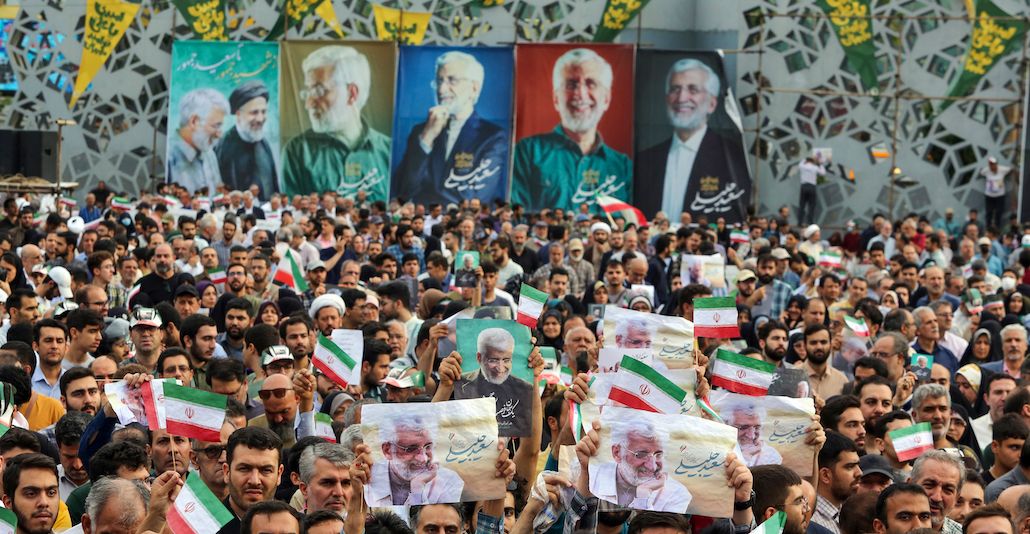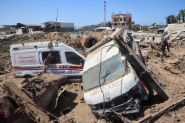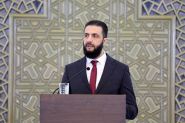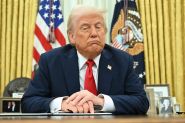
©Supporters attend an election campaign rally by Iranian presidential candidate and ultraconservative former nuclear negotiator Saeed Jalili in the capital Tehran, on June 24, 2024 (Photo by RAHEB HOMAVANDI / AFP)
Iranians vote on Friday to elect a new president from six candidates, including a lone reformist who hopes he can challenge the dominance of conservatives in the Islamic Republic.
A presidential election had not been due until 2025, but was brought forward after ultraconservative Ebrahim Raisi died in a helicopter crash last month.
Leading contenders for Iran's second highest-ranking office are conservative parliament speaker Mohammad Bagher Ghalibaf, ultraconservative former nuclear negotiator Saeed Jalili, and the sole reformist, Massoud Pezeshkian.
The others are conservative Tehran mayor Alireza Zakani, cleric Mostafa Pourmohammadi, and incumbent vice president Amirhossein Ghazizadeh-Hashemi, the ultraconservative head of the Martyrs' Foundation.
The six have staged largely low-key campaigns, which included televised debates where they vowed to tackle economic challenges and offered varied views on Iran's relations with the West.
Ali Vaez of the International Crisis Group says the new president will also have to tackle the challenge of the deepening “fissure between the state and society.”
Supreme leader Ayatollah Ali Khamenei, who wields the ultimate authority in Iran, urged “high participation” on Friday.
In the 2021 election that brought Raisi to power, voters shunned the polls after many reformists and moderates were disqualified.
The turnout then was just under 49% – the lowest in any presidential election in Iran.
People appear divided over whether voting will mean any key concerns being addressed.
These include the mounting effects of soaring inflation and the decline of the rial against the dollar.
One concern among voters is whether a new president will mean a potential change to the contentious hijab law for women, particularly since the mass protests triggered by the 2022 death in custody of Mahsa Amini.
Most of the candidates have been cautious in the televised debates, saying they generally opposed the use of violence against those who do not wear the mandatory headscarf.
For many women, the idea of a change to the hijab laws seems far-fetched.
Neda said, “The hijab law will never be lifted since this is the Islamic Republic.”
“I don't think any president would be willing to change this law.”
By Menna Zaki and Ramin Khanizadeh, with AFP
A presidential election had not been due until 2025, but was brought forward after ultraconservative Ebrahim Raisi died in a helicopter crash last month.
Leading contenders for Iran's second highest-ranking office are conservative parliament speaker Mohammad Bagher Ghalibaf, ultraconservative former nuclear negotiator Saeed Jalili, and the sole reformist, Massoud Pezeshkian.
The others are conservative Tehran mayor Alireza Zakani, cleric Mostafa Pourmohammadi, and incumbent vice president Amirhossein Ghazizadeh-Hashemi, the ultraconservative head of the Martyrs' Foundation.
The six have staged largely low-key campaigns, which included televised debates where they vowed to tackle economic challenges and offered varied views on Iran's relations with the West.
Ali Vaez of the International Crisis Group says the new president will also have to tackle the challenge of the deepening “fissure between the state and society.”
'No Way I'm Voting'
Supreme leader Ayatollah Ali Khamenei, who wields the ultimate authority in Iran, urged “high participation” on Friday.
In the 2021 election that brought Raisi to power, voters shunned the polls after many reformists and moderates were disqualified.
The turnout then was just under 49% – the lowest in any presidential election in Iran.
People appear divided over whether voting will mean any key concerns being addressed.
These include the mounting effects of soaring inflation and the decline of the rial against the dollar.
Dress Code Concerns
One concern among voters is whether a new president will mean a potential change to the contentious hijab law for women, particularly since the mass protests triggered by the 2022 death in custody of Mahsa Amini.
Most of the candidates have been cautious in the televised debates, saying they generally opposed the use of violence against those who do not wear the mandatory headscarf.
For many women, the idea of a change to the hijab laws seems far-fetched.
Neda said, “The hijab law will never be lifted since this is the Islamic Republic.”
“I don't think any president would be willing to change this law.”
By Menna Zaki and Ramin Khanizadeh, with AFP
Read more



Comments